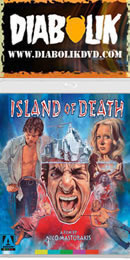
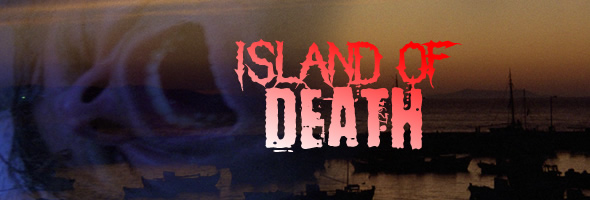
Color, 1976, 106m.
Directed by Nico Mastorakis
Starring Robert Behling, Jane Lyle, Jessica Dublin, Gerard Gonalons, Jannice McConnell
Arrow (Blu-ray & DVD) (US, UK R0 HD/NTSC) / Image, Omega (DVD) (US R0 NTSC), Vipco (UK R0 PAL)


Color, 1976, 106m.
Directed by Nico Mastorakis
Starring Robert Behling, Jane Lyle, Jessica Dublin, Gerard Gonalons, Jannice McConnell
Arrow (Blu-ray & DVD) (US, UK R0 HD/NTSC) / Image, Omega (DVD) (US R0 NTSC), Vipco (UK R0 PAL)
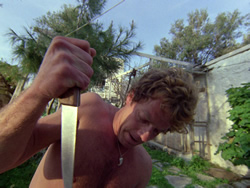 One-man Greek exploitation factory Nico Mastorakis was still a newcomer at the height of the golden era of cinematic
One-man Greek exploitation factory Nico Mastorakis was still a newcomer at the height of the golden era of cinematic 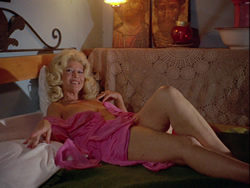 sex and violence when he made this oddball shocker, which still confounds most viewers and remains difficult to assess. Essentially unseen in America until its debut on DVD, the film was infamous in the UK as a video nasty (even in censored form as A Craving for Lust) and encountered censorship hassles in numerous countries. Seen today its mixture of softcore T&A (of which there is plenty) and sadistic violence doesn't seem all that unusual, though the twisted details make all the difference.
sex and violence when he made this oddball shocker, which still confounds most viewers and remains difficult to assess. Essentially unseen in America until its debut on DVD, the film was infamous in the UK as a video nasty (even in censored form as A Craving for Lust) and encountered censorship hassles in numerous countries. Seen today its mixture of softcore T&A (of which there is plenty) and sadistic violence doesn't seem all that unusual, though the twisted details make all the difference.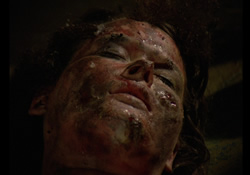 openly claimed he made the film to cash in on the wave of extreme horror films coming out at the time, particularly The Texas Chain Saw Massacre, though tonally it seems like he's aiming for something closer to Last House on the Left. However, the execution is often baffling; it never even tries to be frightening, often feeling closer to a black comedy gone completely off the rails. At times it also recalls the flat, mean-spirited tone of later
openly claimed he made the film to cash in on the wave of extreme horror films coming out at the time, particularly The Texas Chain Saw Massacre, though tonally it seems like he's aiming for something closer to Last House on the Left. However, the execution is often baffling; it never even tries to be frightening, often feeling closer to a black comedy gone completely off the rails. At times it also recalls the flat, mean-spirited tone of later 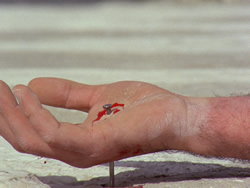 H.G. Lewis like The Gore Gore Girls, delivering as many exploitable elements as possible (including a bizarre golden shower moment that must be seen to be believed) while mixing the avenging angel aspect to morally confuse things even more. Later seen in a number of bit parts in American films like The Enforcer and Cujo before his very gruesome real-life suicide, Behling is actually a pretty strong presence throughout the film with Lyle (who reteamed with him in another Greek-shot horror film, Land of the Minotaur) alternating between flailing awkwardness and charming naivete. Mastorakis would go on to make far more polished and traditionally entertaining films (most notably The Wind, Blind Date, and the nutty The Zero Boys), but this is most likely the one for which he will be remembered among cult movie buffs.
H.G. Lewis like The Gore Gore Girls, delivering as many exploitable elements as possible (including a bizarre golden shower moment that must be seen to be believed) while mixing the avenging angel aspect to morally confuse things even more. Later seen in a number of bit parts in American films like The Enforcer and Cujo before his very gruesome real-life suicide, Behling is actually a pretty strong presence throughout the film with Lyle (who reteamed with him in another Greek-shot horror film, Land of the Minotaur) alternating between flailing awkwardness and charming naivete. Mastorakis would go on to make far more polished and traditionally entertaining films (most notably The Wind, Blind Date, and the nutty The Zero Boys), but this is most likely the one for which he will be remembered among cult movie buffs. 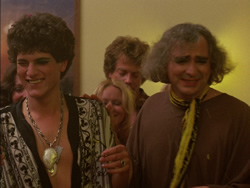 video nasty issues, theatrical release, home video history, and alternate titles including Devils in Mykonos, Isle of Perversion (about which he offers a funny little joke), and even Psychic Killer II! Lots of clips both familiar and rare from Mastorakis' career are included as well including Death Has Blue Eyes, which was shot before this the same year but released in most territories after it, plus a bizarre bit of trivia about the infamous disaster The Greek Tycoon. His analysis is very useful here as he pulls apart the disturbing aspect of telling the story through the eyes of these two characters,
video nasty issues, theatrical release, home video history, and alternate titles including Devils in Mykonos, Isle of Perversion (about which he offers a funny little joke), and even Psychic Killer II! Lots of clips both familiar and rare from Mastorakis' career are included as well including Death Has Blue Eyes, which was shot before this the same year but released in most territories after it, plus a bizarre bit of trivia about the infamous disaster The Greek Tycoon. His analysis is very useful here as he pulls apart the disturbing aspect of telling the story through the eyes of these two characters, 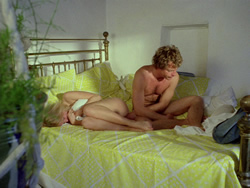 which often makes it difficult to tell where the film really stands about their hypocritical outlook, and tackles the tricky sexual politics that still feel more than a bit queasy. "Return to the Island of Death" is a 17-minute featurette with the director returning to the filming locations, accompanied by the guy who carries the luggage at the beginning of the film. The 23-minute Mastorakis interview is pretty essential after you've seen the film as he lays out his motivations for making the film and covers the varied history of the various actors (including the reason he himself appears in an awkward supporting role). He also says he would never show the film to his own child and says he takes no pleasure in the feature itself ("I don't know why people watch it!"). The anecdote about shooting the goat scene is a relief to hear, too. The four-part The Films of Nico Mastorakis has been included in various configurations on releases of his other films, broken up into segments about his early years (up to Skyhigh), the period from The Zero Boys to Terminal Exposure, an entire one on the cable favorite Nightmare at Noon, and a final wrap up. Alternate title sequences are also included as Devils in Mykonos and Island of Perversion, the latter with music instead of the usual camera shutter sounds, while "Island Sounds" presents five selections from the film's soundtrack (including those weirdly catchy theme songs, "Do You Love Me Like I Love You" and "Destination"). The disc rounds out with the theatrical trailer (under yet another alternate title as Cruel Destination) and a 34-minute reel of video trailers for all of the other Mastorakis titles owned by Omega Pictures (Blind Date, Skyhigh, The Zero Boys, Glitch!, Nightmare at Noon, Bloodstone, Grandmother's House, Hired to Kill, In the Cold of the Night, The Naked Truth, and .com for Murder.
which often makes it difficult to tell where the film really stands about their hypocritical outlook, and tackles the tricky sexual politics that still feel more than a bit queasy. "Return to the Island of Death" is a 17-minute featurette with the director returning to the filming locations, accompanied by the guy who carries the luggage at the beginning of the film. The 23-minute Mastorakis interview is pretty essential after you've seen the film as he lays out his motivations for making the film and covers the varied history of the various actors (including the reason he himself appears in an awkward supporting role). He also says he would never show the film to his own child and says he takes no pleasure in the feature itself ("I don't know why people watch it!"). The anecdote about shooting the goat scene is a relief to hear, too. The four-part The Films of Nico Mastorakis has been included in various configurations on releases of his other films, broken up into segments about his early years (up to Skyhigh), the period from The Zero Boys to Terminal Exposure, an entire one on the cable favorite Nightmare at Noon, and a final wrap up. Alternate title sequences are also included as Devils in Mykonos and Island of Perversion, the latter with music instead of the usual camera shutter sounds, while "Island Sounds" presents five selections from the film's soundtrack (including those weirdly catchy theme songs, "Do You Love Me Like I Love You" and "Destination"). The disc rounds out with the theatrical trailer (under yet another alternate title as Cruel Destination) and a 34-minute reel of video trailers for all of the other Mastorakis titles owned by Omega Pictures (Blind Date, Skyhigh, The Zero Boys, Glitch!, Nightmare at Noon, Bloodstone, Grandmother's House, Hired to Kill, In the Cold of the Night, The Naked Truth, and .com for Murder.![]()